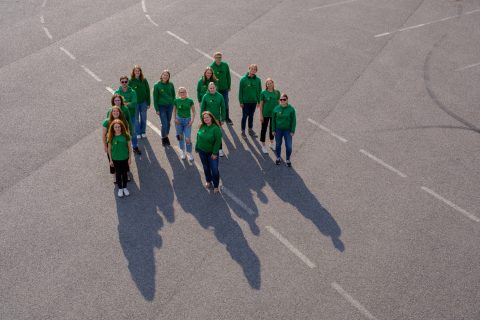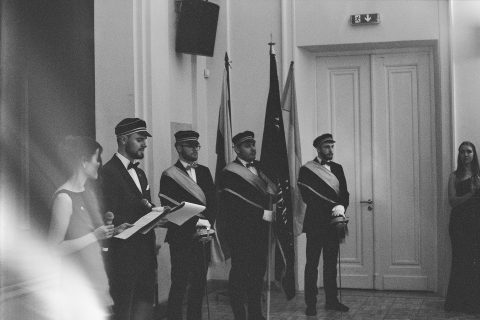Affordable drinks, approachable staff, and flexible hours – an ideal student bar (pub, café) doesn’t need much more than that. Sticky floors and a space for socializing are also important aspects. Location within the city is key too – it’s great if the bar is at the crossroads of different universities (or at least faculties), as it increases opportunities for cultural exchange. While it’s a fact that more and more high school and university students are getting swept up in the trend of chain cafés, we should give a round of applause for the fact that Kaunas still has the last bastion of the “old times”, briefly mentioned in this issue by my colleague Gunaras.
Did you know that Džem’pub was originally meant to be a jazz club? Of course, the history of the building, which is located very close to the heart of Laisvės Avenue, extends far beyond the 19 years celebrated by the establishment this year. The location has been somewhat trendy for many years. As Kastytis Rudokas notes on the KTU Architecture and Urbanism Research Center website, in 1966, a sewing department for the Mada factory was built here. Along with the KPI student campus, Pramprojekt, and Žemprojekt (also described in this issue), it was one of the “first notable public buildings” in post-war Kaunas. “Declaratively rational, minimized form, complete rejection of ornamentation, and strip windows – all of these became the standard for nearly fifteen years,” the author notes in the text, also emphasizing the renovation of Mada building that was done in 2002 in the slick-tech style characteristic of business architecture at that time.
It’s likely that the reconstruction plan already included the idea of establishing a dining business on the fifth floor, introduced during the renovation, with a terrace offering a fantastic view. However, Džem’pub was not the first occupant; another bar had already operated on the premises. The future founder of Džem’pub, Kęstutis Narušas, was gaining experience in other city bars at the time, including the now-legendary Suflerio būdelė at the Kaunas Small Theatre (unfortunately, neither the bar nor the theater is operational anymore). In an interview with the website BZNstart, the entrepreneur mentioned that the investment required was neither too much nor too little – around a few hundred thousand litas. Just the concert equipment alone cost about 70,000 litas. An interesting fact was revealed to me by Giedrius Ibianskas, the venue’s long-time employee. Although it often seems that the sound quality here is quite poor, there is a good reason for that: the neighbors. Because of them, low frequencies on the bar’s audio mixer are practically non-existent.
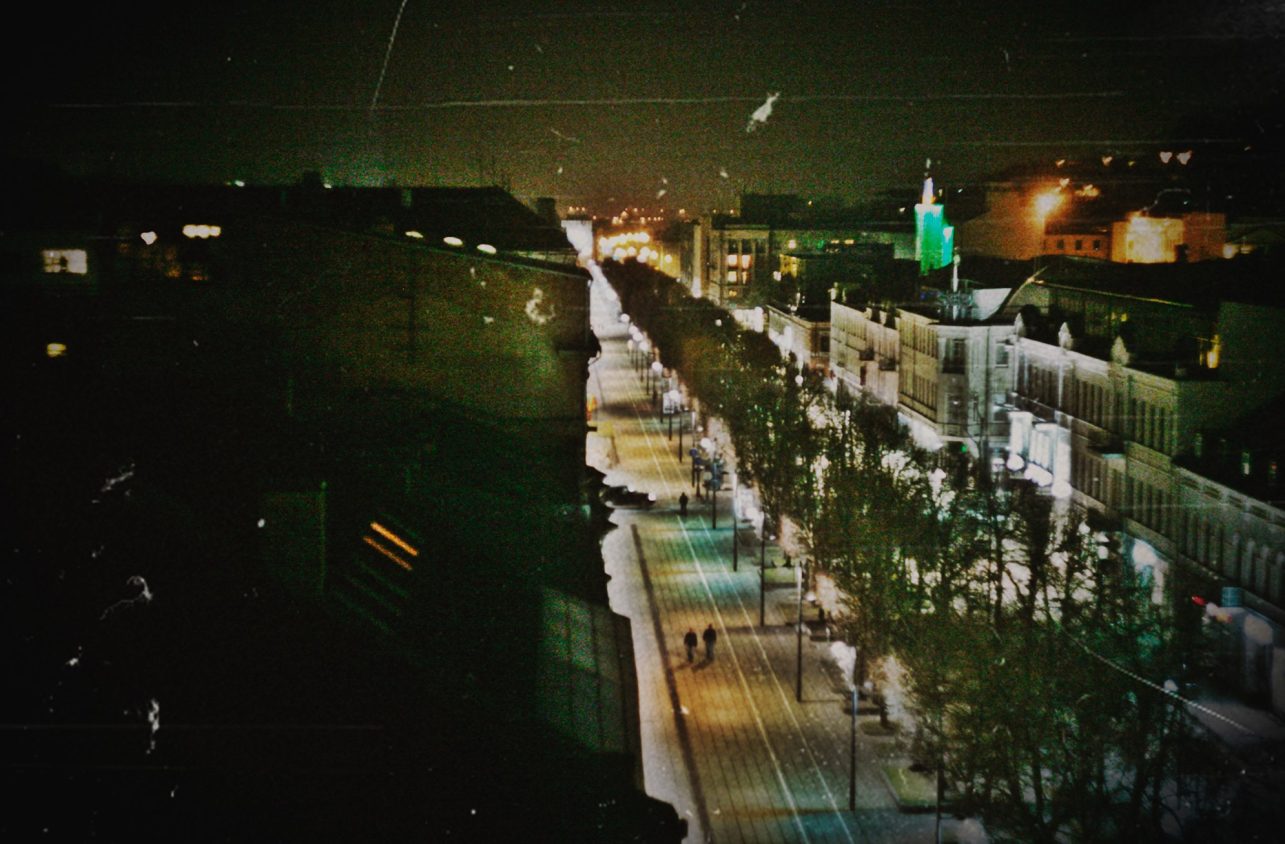
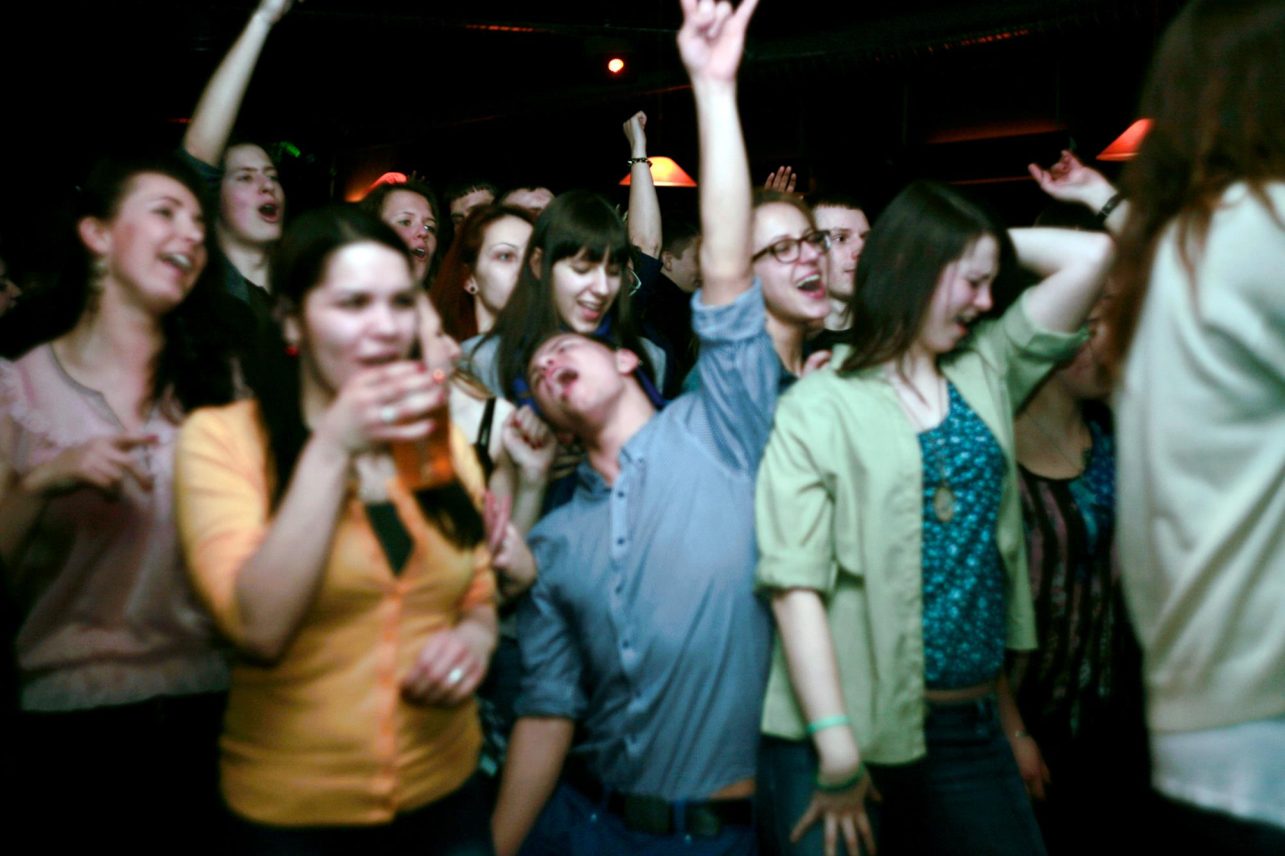
I met with Giedrius, known to many Kaunas residents as Giesha, at another bar called Vingiu Dubingiu popular among the academic crowd, particularly PhD students and lecturers. When I jokingly asked him about his education, he seriously replied that he was a second-year student of computational linguistics at KTU for seven years. The young man had come to the recently opened bar after returning to Kaunas from a Work & Travel trip to the UK. He vividly recalls sitting there, drinking beer, the concert had just ended, and the DJ hadn’t shown up for work that day. “I just opened my laptop and started playing music.” That’s how Giesha’s career began on the fifth floor, officially lasting exactly ten years. There was communication, event hosting, sound management, and even occasional help behind the bar. Although Giedrius no longer works there, he still organizes trivia nights, which is how many people recognize him on the street. Or from the karaoke nights, which are one of the main reasons to ascend (by elevator or, gasp, by stairs) to the heights where the bar is located.
The idea of a jazz club mentioned at the beginning of the text was nice, but it was buried rather quickly. Although Kaunas is sometimes referred to as a jazz city, there weren’t enough people interested in the club, and rock concerts were more enticing. Giesha played rock – including its various subgenres – during the parties, which had free admission. This is one reason why, although students weren’t part of the original owner’s vision, Džemʼpub eventually became a symbol of student life in Kaunas. The range of music genres also broadened – Giedrius is pleased that he managed to persuade the owner to invite TWNKL, a disco project by Jurgis Didžiulis that was very popular around 2010 and even played in Vilnius’ Gravity club.
Another reason for its success among students is the long tables that can accommodate large groups celebrating, say, a mid-term, as well as smaller groups that others can join if they come alone or in pairs. These tables have witnessed countless connections, leading to everything from young families to startups and other collaborative projects. “I used to joke that this bar is for first to fourth-year students; after that, people discover other places because sticky floors and plastic cups aren’t as appealing anymore,” Giesha says, adding that this was how it used to be. Now the bar’s visitors’ ages range from 20 to 40. The oldest ones grew up here and never left. And even if they don’t sing in unison, at least they dance together.
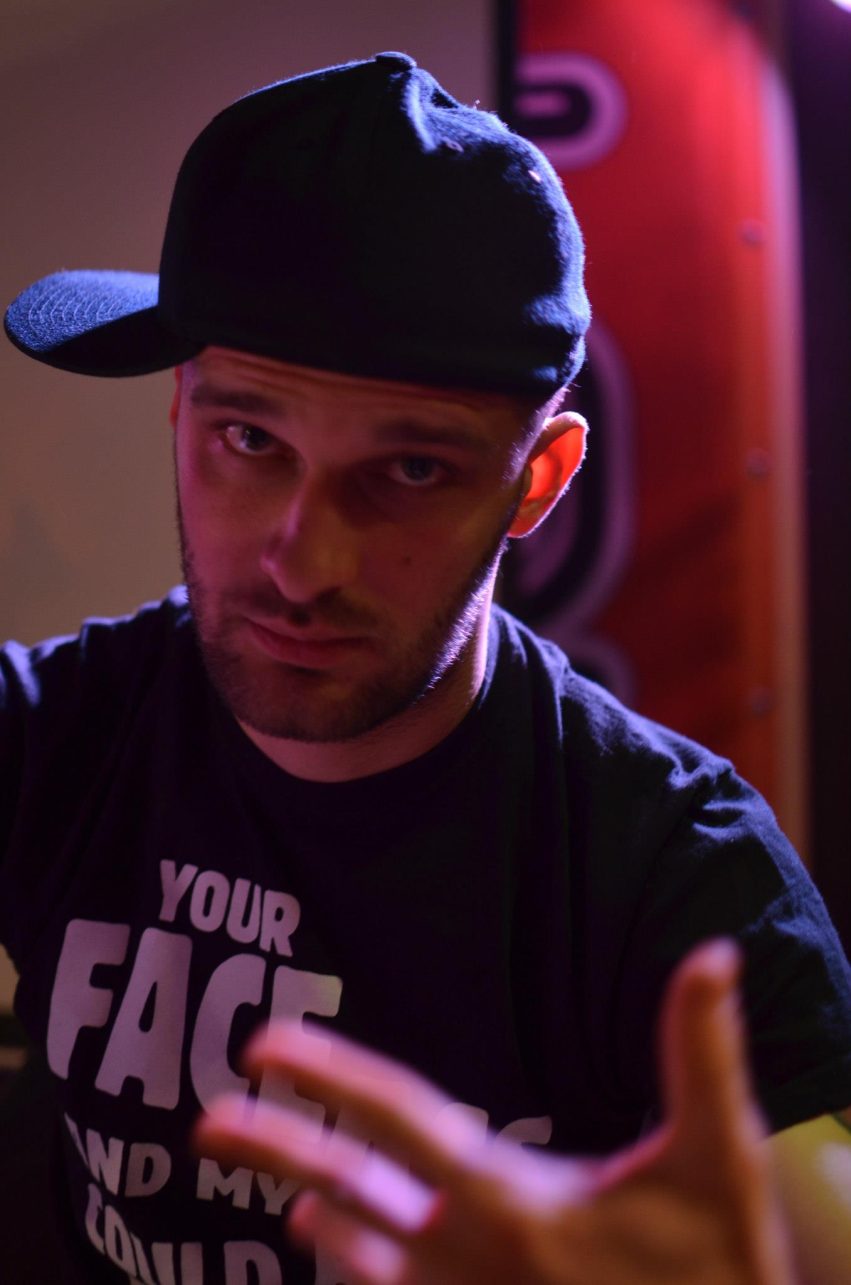
The people of Kaunas borrowed the idea of karaoke from the Bix bar, a favorite among students in the capital. In a country with a somewhat reserved mentality, the concept developed slowly, with even the bar’s security staff having to sing until Džem’pub was discovered by the Erasmus community. “They needed a place where they could sing and relax. You could use the headline ‘Erasmus Students Liberated Kaunas’,” Giesha recalls this unexpected synergy. It was the Erasmus students who introduced the notion to Kaunas’s sociocultural norms that at Džem’pub, there’s always a party on Tuesdays, meaning Tuesdays are actually little Fridays. When asked about his own favorite karaoke song, Giesha modestly says that he only sings when he really shouldn’t be singing anymore.
Not everyone is so modest. Warm greetings are sent by Nico, a Roman now living in Portugal, who spent a wonderful Erasmus period in Kaunas. He wrote to me that he smiles every time he remembers this bar. This November marks ten years since Nico discovered the karaoke nights on the fifth floor, “I always dreamed of being a singer, and thanks to this place, I made it happen. The magical atmosphere, vibe, and energy make it a very inspiring place.” Incidentally, the Italian will be visiting Lithuania in early November and has already marked a nostalgic Tuesday on his calendar. He mentioned that his favorite song to sing is Bon Jovi’s “It’s My Life.”
Not only students from abroad but also travelers or people visiting our city for events or work are happy to choose this bar. The reason is simple – it’s in a great location, and it’s been around for a long time, so it has a lot of good reviews online. Although rock music and hoppy drinks are a universal language, there are definitely cases of getting lost in translation. On the bar’s simple “like at mom’s” menu, there are, of course, octopus’ dishes, which are made from… sausages. “Oh, what a good price for seafood,” the tourist couple may have thought.
The turnover of bars on Laisvės Avenue is quite rapid. Not to mention that there aren’t any authentic interiors from the interwar or Soviet occupation eras (except for the cafeteria near the Soboras) left, it must be noted that even the extravagant architectural solutions of the 2000s have not been preserved (though the interior of the former City Metro club under the Metropolis hotel still remains). The avenue underwent significant changes after a recent major renovation, and earlier, the bar business suffered a strong blow from the economic crisis. Interestingly, Džem’pub, a place known for its democratic prices, free parties, and live concerts, managed to benefit from this situation. When we say, “live concerts”, we mean names like Andrius Mamontovas. Now, with more venues appearing in Kaunas (though still not enough), such evenings have become rarer here.
I mentioned the romantic relationships that started at Džem’pub, but the truth is that the attractiveness of this place also brought about some problems. Inga, who now lives in Kaunas but used to reside in the Linksmadvaris dormitory, recalls one winter night when, with the temperature at 25 degrees below zero, she and a friend first made sure the DJ had really played the last song of the night before walking home. They chose to walk because 9 litas for a taxi seemed ridiculously expensive. It was not only cold and dark but also very slippery, so the journey took quite some time. Only after returning to the dorm did Inga notice about 40 missed calls from her boyfriend, who had been anxiously waiting for her. But everything ended well – the couple is happily married.
So, we have a student bar that brings couples together and warms people’s hearts. It also invites you to challenge your brain. My colleague Tauras interviewed Narmin, the host of English trivia nights, in this magazine, while Giesha is responsible for the Lithuanian ones. Just like with the DJ he accidentally replaced, Giesha only took the place of a friend temporarily, until he realized that he had been doing it for a decade. “The team doesn’t need to have five PhDs. Trivia nights, which I organize with two other colleagues, are more for those who came for a pint and stayed,” Giedrius explains, adding that after the mental workout on Wednesdays, beer pong awaits.
What about Thursdays? Comedian Paulius Ambrazevičius takes over the microphone then. Before Humoro klubas event on November 5, 2011, the queue stretched all the way to the fountain. This was a return of the collective that was already known from the TV but had slowed down its activities after the death of their friend Modestas Vaikšnoras. The event was initiated by Giesha and his then-girlfriend. They simply missed good humor in Kaunas. “Until then, after Modestas’ death, we had organized 7 performances over a year and a half. Within a year from that November 5th, we did 30 performances, Stonkus came on board, Jankevičius returned, Klajumas joined, and voila. From that performance, we took off, and that’s how the entire Lithuanian comedy scene really blossomed,” Paulius recalls, feeling a special fondness for the bar on the fifth floor, even though he never studied in Kaunas himself. Going back to Thursdays: yes, jokes are made in Džem’pub but they are not always funny, in other words, it hosts open mic nights.
“When I worked here, I was the most relaxed among my friends – I was doing what I loved, in a place I loved, and I received a lot of attention from the people who came here,” Giedrius recalls nostalgically, reflecting on a time when autumn was the most eagerly awaited season. The fifth floor has gifted him a strong sense of empathy for those around him. As our conversation draws to an end, I can’t help but ask which song is his favorite from the Džem’pub era. Everything is very symbolic!
Do you remember the film Eurotrip, which inspired thousands of young travelers? The song “Scotty Doesn’t Know” by Lustra, which was in the film’s soundtrack, was probably played most times on the fifth floor, at least by Giedrius. According to him, this song is not for gentle dancing but for going completely wild.

